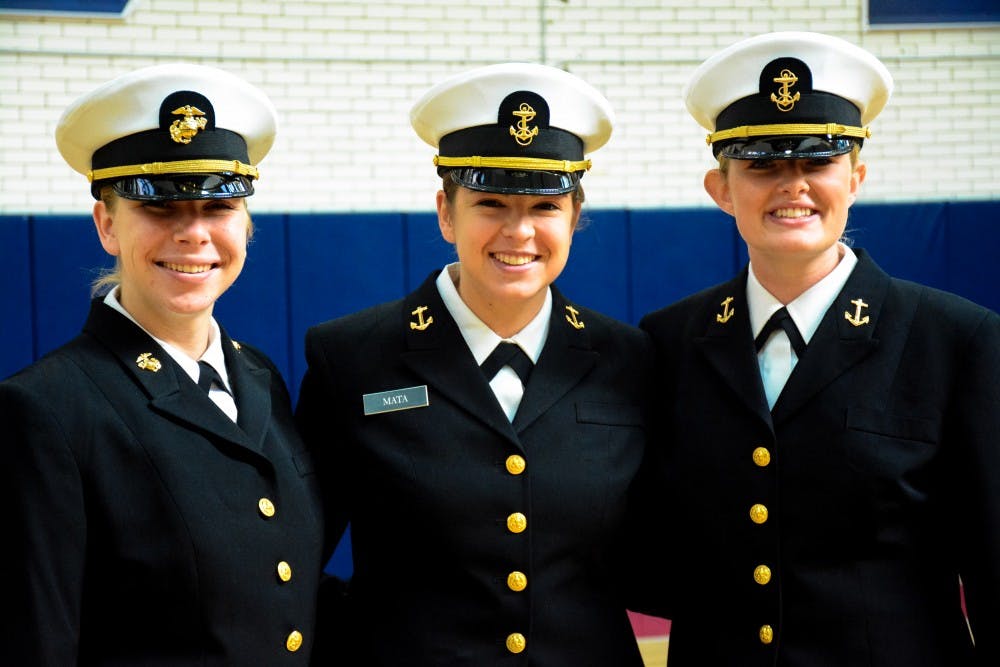
ROTC student-athletes face time commitments unparalleled anywhere else on campus.
They say football games are battles in the trenches. A well-thrown ball is a bullet. Deep home runs are bombs.
All these are overused cliches, but some — including six students on Penn’s campus —actually live them.
These six are Penn’s Reserve Officer Training Corps athletes. They work to achieve peak physical and mental performance in representing both their school and their nation.
The ROTC training sessions consist of both physical and mental training. The candidates need to be prepared for active duty as a commissioned officer, and receive training for all aspects of their future service.
“Every week we have Tuesday and Thursday morning [physical training] ... then we have class afterwards: military science class and also leadership classes,” freshman wrestler and cadet Patrick Munn explained.
Their commitment to this grueling schedule is astounding. Each of them endure daily practice with their respective teams, ROTC training sessions and an Ivy League work load week after week.
“It’s been a learning process balancing those three things and it’s still something I’m learning how to do. There’s a lot of working with my coaches and professors ... and just making sure I have my priorities straight,” Midshipman and junior women’s hammer thrower Bianca Donadio said.
Sprint football linebacker and future Army officer Tom Console agreed.
“Total time commitment [for ROTC] in the week is about 10 hours. ... It piles up.”
That time commitment is welcomed by Donadio’s ROTC mentor and field hockey player Liz Mata. What seems like an awful and action-packed schedule is simply her doing all the things she loves.
“If you really care about it, you’re going to put a lot of time into it,” Mata said. “Time-wise it’s actually not bad. It’s definitely early mornings though.”
That said, time is not the largest commitment for these officers-in-training. The ROTC program ends in the candidate becoming a fully commissioned officer in the US military.
For wrestler Jack Conway, the commitment to follow in his family’s footsteps and serve his nation takes on a much more important role. To hear him tell it, active duty service was always the plan.
“I come from a military family, so initially I was thinking [of attending the military academy at] West Point,” he said. “I’m looking forward to senior year and being commissioned in the Army.”
Of the six ROTC athletes at Penn, three come from a military family with a history of service. The others were inspired — by a friend, a distant relative or a feeling of patriotism — to join the program.
The narrative surrounding much of the military is one of sacrifice. To be sure, our military makes massive sacrifices for the protection of this nation, but the tone struck by future officers like Maggie Smith, a lacrosse player who is also another of Mata’s mentees in the naval program, was one of excitement for their service.
“I’m looking forward to ... just everything honestly. I’m really looking forward to serving my country as an officer, getting leadership experiences, seeing the world, and doing my duty as an American,” she said.
That excitement is one that also surrounds their sports. In fact, Console and Smith see a lot of parallels between their two passions.
“They’re very similar. On the football field, you have to lead by example but you also have to motivate people with your words and you have to know how people work and people think to get results and in the Army, it’s very, very similar,” he said. “The only real difference is obviously there is a hierarchy [in the military].”
“Both are not only physically demanding but mentally demanding. ... I thought that I knew what teamwork was [from sports] but the ROTC is just a different type of team work,” Smith said. “It’s really a type of teamwork where everyone really has everyone’s back... it’s like that on my team too but the navy has definitely brought a higher intensity.”
Perhaps then, those cliches were justified.
The Daily Pennsylvanian is an independent, student-run newspaper. Please consider making a donation to support the coverage that shapes the University. Your generosity ensures a future of strong journalism at Penn.
Donate







